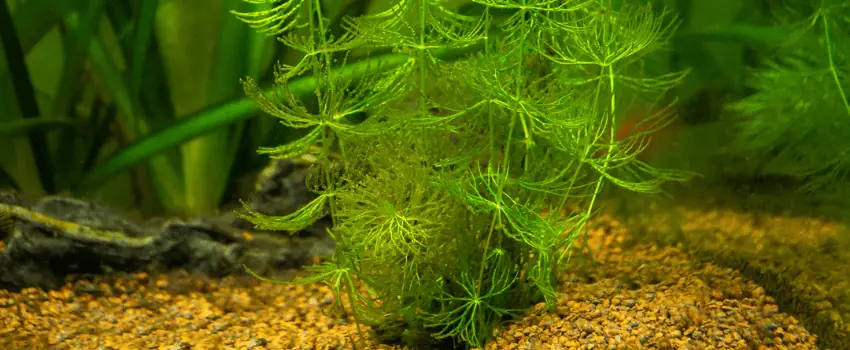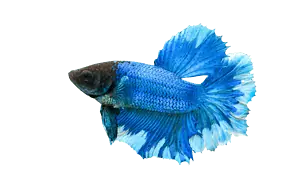Floating aquatic plants add visual interest to a betta tank. They also make excellent hiding spots for your betta.
When choosing aquarium plants, you must keep your betta’s safety in mind. Some plants have sharp edges or contain harmful toxins.
One of the most popular floating aquatic plants is hornwort.
But is hornwort safe for betta fish?
Hornwort is safe for betta fish as long as you take proper care of the plant. Hard water and age can make the plant leaves become tough as a defense. Hornwort also hardens due to nibbling from snails and shrimp. These stiff leaves may tear a betta’s delicate fins and cause other injuries.

Table of Contents
What Is Hornwort?
Hornwort is a fast-growing floating aquatic plant. It grows in a wide range of water conditions and climates around the world except for Antarctica.
In favorable conditions, hornwort can grow up to 5″ inches in one week!
Some consider hornwort an invasive species due to how fast it grows. The plant also has allelopathic qualities, which means it can stunt the growth of surrounding plants.
These allelopathic qualities also prevent the growth of blue-green algae. This is useful because blue-green algae usually cover plants and block their nutrient absorption.
Hornwort has thin, needle-like leaves with a dark green to light green color, depending on temperature and lighting. The leaves grow in clusters of 6-12 on a stem, with many stems on a single plant.
As hornwort reproduces, tiny flowers grow from the main stem. These flowers range in color from deep red to pink and brown.
These flowers produce an oval fruit around 0.16″ inches in diameter.
What Are the Best Growing Conditions for Hornwort?

Hornwort is a hardy plant and can grow in a variety of environments.
In the wild, the plant grows in slow-moving streams, ponds, lakes, and marshes.
You do not need a special substrate for growing hornwort since it floats on the surface.
Hornwort is a beginner-friendly plant with few care requirements other than frequent trimming.
Lighting
Hornwort needs a healthy balance of light to thrive.
Extreme lighting turns hornwort a brown color and causes the leaves to fall out. This gives the plant a sparse appearance.
Without enough light, hornwort sheds its leaves and starts rotting. The plant also turns pale green or yellow.
Exposure to medium LED aquarium lights for around 10-12 hours daily helps the hornwort maintain its dark green color.
Ensure your lighting setup covers the entire length of the tank for the best growing conditions.
Water Temperature, pH, and Hardness

Hornwort grows best in temperatures between 59-86° degrees Fahrenheit (15-30° C).
The plant does well in a betta tank where ideal temperatures range from 78-80° degrees Fahrenheit (27° C).
Betta tanks have an optimal pH of 6.5-7.0, which falls within the range for hornwort at 6-7.5.
Hornwort can grow in water with a general hardness of up to 15 dGH. Hard water makes the hornwort plant stiffen up, making it a possible hazard for your betta.
The average water hardness in a betta tank should range from 3-4 dGH. At these hardness levels, hornwort is less likely to harden.
If your water is too hard, soften it by adding Indian almond leaves or a commercial water softener.
Pay attention to water conditions in your betta tank. Sudden changes in your water parameters cause hornwort leaves to fall out.
Water parameter stability is also crucial to your betta’s health.
A Larger Tank
Hornwort is not a plant you place in a 5-gallon tank.
The plant needs plenty of space for growing. It overgrows fast in a smaller tank.
Overgrowth of hornwort blocks light from reaching other plants in the aquarium.
A thick layer of hornwort also prevents your betta from swimming to the surface for air.
You need at least a 15-gallon tank for growing hornwort. A 20-gallon tank or larger is even better.
Common Issues with Hornwort
Hornwort is easy to grow and care for. But there are some downsides you must know about before placing it in your betta tank.
Excess Plant Debris

A hornwort plant loses its leaves occasionally as it grows, and parts of the plant die off.
Surface agitation or changes in water parameters make hornwort lose its leaves as well.
These leaves fall to the substrate and start decomposing.
If you do not have shrimp or other plant eaters, this can create a problem in your tank.
As the excess plant matter decomposes, it releases toxins, causing a spike in your tank’s ammonia and nitrite levels.
Using a gravel vacuum during weekly partial water changes removes the plant debris from your substrate.
Clogged Filter
Besides creating a mess on your substrate, the needle-like leaves on the hornwort can clog your filter over time.
A clogged filter intake cannot remove harmful bacteria and circulate the water.
Rinsing your filter media in tank water regularly prevents this issue.
Make a habit of checking your filter during your normal weekly tank cleaning routine.
Never rinse your filter media in plain tap water. This washes away beneficial bacteria and may introduce chlorine into your betta tank.
Torn Fins
As a hornwort plant ages, its leaves may become stiff.
Hard water and constant nibbling from snails also cause hornwort to toughen up.
The stiffer leaves may tear your betta’s delicate fins or damage its scales.
With the proper water parameters, this is less likely to happen.
Check the texture of your hornwort occasionally and ensure it is not too stiff for your betta to swim around in.
Trim away any rough parts of your hornwort or remove the whole plant if it becomes too stiff.
Lack of Nutrients
Hornwort plants are nutrient sponges. This is both good and bad.
Removing excess nutrients from the water column helps your tank parameters remain more stable.
But if your hornwort removes too many nutrients, there may not be enough left for your other plants.
Weekly water changes usually prevent this from happening.
If you have concerns about the growth of other plants in your tank, you may consider adding a fish-safe fertilizer to the water.
Rapid Growth
The rapid growth of hornwort can create problems in your betta tank.
Without regular trimmings, the hornwort grows too thick on the surface. This thick layer prevents light from reaching other plants in your tank.
Another issue with rapid growth is the waste produced by fallen leaves.
These fallen leaves create a mess on your substrate and may clog your water filter.
When removing hornwort from your betta tank, you must dispose of it correctly. If the plant reaches local waterways, its rapid growth can choke out other native plant species.
Is Hornwort Toxic to Bettas?

While hornwort releases chemicals inhibiting the growth of other plants, it is not toxic to fish.
Many fish species eat hornwort without issues. Shrimp and snails snack on hornwort, too.
Bettas are carnivores, so they usually do not eat plants unless they are starving.
But on the slim chance your betta does eat hornwort, it will not suffer any ill effects.
Do Bettas Use Hornwort as a Hiding Place?
The bushy leaves of hornwort provide a comforting hiding spot for your betta.
Bettas are usually active but need a place to rest and hide.
Some fish owners are wary of hornwort because of its potential to injure delicate fins.
This is usually not a problem if the plant is well-cared for and your water parameters are stable.
If you have concerns about hornwort, check the leaves regularly to ensure they are not too tough.
Does Hornwort Provide Any Benefits to Betta Fish?
Besides offering hiding and resting spots, hornwort provides your betta with entertainment.
Hornwort offers your betta new places for exploring and building bubble nests.
Bettas are intelligent and curious fish.
Floating plants like hornwort provide enrichment, so your betta does not get bored.
The dense foliage also lowers stress by giving your betta a sense of security.
Domestic bettas are not threatened by predators in their tank. But providing plenty of hiding spots gives your fish some comfort.
In a community tank, hornwort lets your betta hide and rest when it becomes overstimulated by its tank mates.
How Much Hornwort Should You Add to a Betta Tank?

One small hornwort plant is all you need for a betta tank.
The plant will multiply fast and cover the surface of your tank.
When buying hornwort, ensure you choose a healthy plant.
Healthy hornwort has a busy appearance with a vibrant green color. Avoid hornwort plants with discoloration or sparse growth.
Propagating hornwort is easy. If you cut some stems off the main plant and leave them in the water, they will grow into new individual plants.
How much hornwort you have in your tank depends on several factors.
If the hornwort growth is so thick it blocks light from the rest of the tank, you must trim it.
Proper light cycles are vital to your betta’s circadian rhythm. Your betta needs a day and night cycle for regulating when to eat and sleep.
You also do not want the hornwort covering the surface because it restricts your betta from breathing air.
Another sign you have too much hornwort is poor growth from your other aquarium plants.
When your other plants start turning yellow or dying off, the hornwort may be leaching too many nutrients from the water. This leaves inadequate nutrients for the rest of your plants.
Can Hornwort Help Maintain Water Quality?
Hornwort has the unique ability to absorb harmful toxins in the water, such as:
- Phosphorus
- Carbon dioxide
- Nitrates
- Ammonia
You must still do weekly water changes, but the hornwort helps prevent toxin buildup in your betta tank.
Hornwort naturally filters the water and can help make a cloudy tank crystal clear.
The plant also oxygenates and aerates your tank water.
Since hornwort is an allelopathic plant, it helps curb algae growth, especially blue-green algae.
Is Hornwort Suitable for All Types of Betta Fish Tanks?
Hornwort is a fantastic choice for most types of betta tanks.
But whether to add hornwort depends on your setup.
Biotope tanks are a good choice for hornwort because the plant blends in with the natural habitat.
Blackwater conditions in a biotope tank setup are suitable for low-light plants. You do not have to worry about the hornwort blocking out too much light.
If you have delicate plants in your tank, you may decide against adding hornwort. Delicate plants are more sensitive to the lack of nutrients caused by the hornwort.
You may solve this problem by adding plant fertilizer to your tank.
Ensure the plant fertilizer is safe for your betta and other tank mates.
Many liquid fertilizers contain copper, which is deadly for shrimp. Too much copper can kill your hornwort plant.
How Often Should You Replace Hornwort in a Betta Tank?

Replace hornwort whenever you notice stiff or tough leaves.
Hornwort becomes stiffer when exposed to poor water conditions or suffers damage. Depending on your tank environment, the plant may also stiffen as it ages.
You must also remove dead hornwort, so it does not rot and interfere with your water parameters.
Remove fallen leaves when you do your weekly water changes. Snails eat the decaying plant matter as well.
Remove the plant immediately if you notice injuries to your betta’s fins caused by hornwort.
9 Safe Alternatives to Hornwort
If you have concerns about the safety of your betta with hornwort, there are several other floating aquatic plant species to choose from.
These plants are safe for your betta fish, and most do not need much maintenance.
You may also choose from a variety of fake plant options.
Ensure the fake plants are silk and not plastic. Plastic plants have sharp edges and may damage your betta’s fins.
Artificial plants do not have the same benefits as live plants. But you never have to worry about fake plants dying.
Live plants are usually preferred because they create a more natural environment for bettas.
1. Red Root Floater
Red Root Floaters are fast-growing aquatic ferns.
This plant has bright red and green leaves with long red roots.
When the plant reproduces, it grows small white flowers.
Red Root Floaters spread fast and may need occasional trimming.
2. Amazon Frogbit
Amazon frogbit is a better alternative to duckweed.
It is less invasive but has similar round green leaves.
Keep an eye on this plant if you have snails in your betta tank. Snails like to eat the undersides of the plants.
3. Water Wisteria
Water wisteria is a great beginner plant and needs minimal maintenance.
This versatile plant can grow in the substrate or float on the surface.
Since this plant has a wide spread, it is best suited for larger tanks.
Water wisteria is bright green with fringed leaves.
4. Brazilian Pennywort
Brazillian pennywort has small, bright green round leaves growing on long stems.
The plant produces small white flowers and has short white roots.
Like water wisteria, you may grow Brazillian pennywort in the substrate or let it float at the water’s surface.
5. Rotala Indica
Rotala Indica, also known as Indian Toothcup, grows in rice paddies throughout Southeast Asia.
This plant is an excellent choice for a betta biotope since it originates in a betta’s native habitat.
Trimming the excess growth prevents the plant from becoming top-heavy.
6. Anacharis
Anacharis is a popular plant in home aquariums. It grows well in a variety of water conditions and temperatures.
This plant features trailing stems and long white roots. In the summer, Anacharis produces small white flowers above the water’s surface.
In the wild, Anacharis sinks and floats in the water column according to the time of day.
When the weather is warm, and the sun is shining, the plant floats to the surface. At night, when temperatures cool down, the plant sinks lower into the water.
7. Water Sprite
Water sprite is an aquatic fern available in most pet stores.
It thrives in the same water conditions as bettas and provides a nice covering for hiding or creating bubble nests.
You may propagate water sprites by cutting pieces from the main stem and letting them float in the water.
8. Water Spangles
Water spangles originate in Central and South America.
This plant has long dangling roots and large flat leaves.
Low water flow is best for this plant, creating a nice canopy for bettas to rest or build bubble nests.
9. Java Moss
Java moss usually grows on rocks or driftwood. But it also thrives by floating on the surface.
This plant has low maintenance and is a favorite among aquarium hobbyists.
You may find Java moss in most pet stores.
Is Hornwort Right for Your Betta Tank?
Some betta owners consider hornwort dangerous. But with proper care and attention, this plant is safe for your betta tank.
Hornwort offers several benefits to your betta and can help maintain cleaner water conditions.
Floating plants create a natural environment for your betta and provide nice hiding spots.
Whichever plants you choose for your betta tank, always ensure they do not contain harmful toxins.
For another idea, check out our detailed article on betta bulbs and how they work well with your fishy pets.


